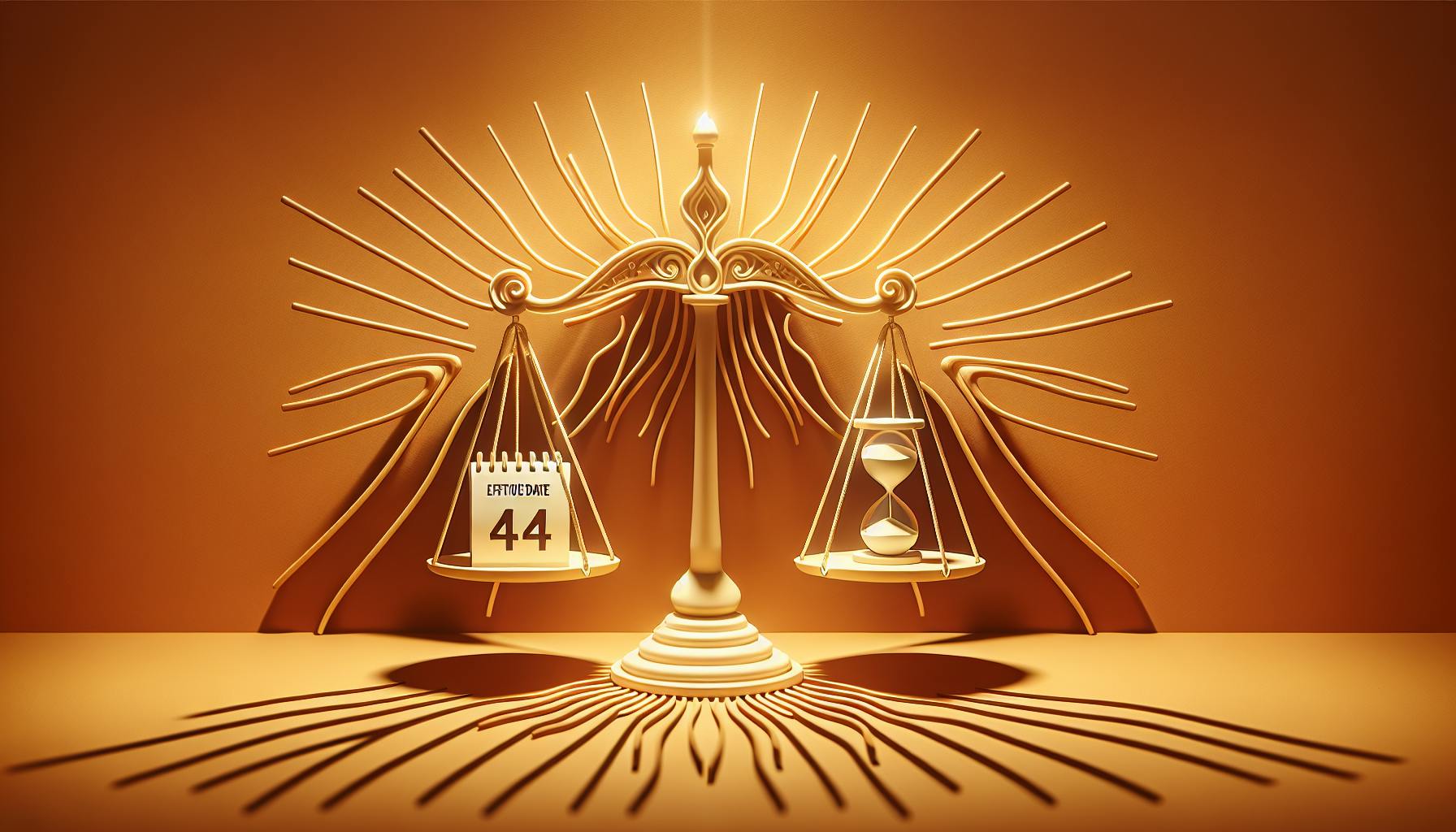Seeking justice is an honorable pursuit, though the complexities of the legal system can present challenges.
This article provides an informative overview of Federal Criminal Procedure Rule 33, which allows for petitioning the court for a new trial under certain circumstances.
We will explore the grounds and timing requirements for new trial motions, study relevant cases, and consider judges' perspectives to gain a well-rounded understanding of this intricate facet of federal criminal law.
Introduction to Federal Criminal Procedure and Rule 33 New Trial Motions
Federal Criminal Procedure provides rules and processes for conducting criminal trials and appeals in federal courts. Rule 33 is an important rule that allows defendants to request a new trial under certain circumstances.
Understanding the grounds and timing for Rule 33 motions is critical for defendants seeking to overturn a guilty verdict. This section will provide an overview of Rule 33 new trial motions within the broader context of federal criminal procedure.
Deciphering Rule 33 within Federal Criminal Procedure
Rule 33 falls under the Federal Rules of Criminal Procedure, which govern processes for federal criminal prosecutions. It allows a defendant to request a new trial if they can show their trial suffered from a serious legal defect or injustice.
Rule 33 aims to ensure fair trials and prevent wrongful convictions. It provides an avenue to address issues like juror or prosecutor misconduct, new evidence, or legal errors at trial.
The rule balances efficiency interests in finality of verdicts with fairness considerations for defendants. Courts disfavor new trial motions, so defendants face high legal standards.
Identifying Grounds for New Trial Motions Under Rule 33
Defendants can request a new trial under Rule 33 on limited legal grounds. Major grounds include:
- Juror misconduct: Bias, improper communications, disregarding court instructions on the law
- Prosecutorial misconduct: Withholding evidence, inflammatory arguments, misstating law or evidence
- New evidence: Exculpatory evidence discovered after trial showing innocence
- Legal errors: Improper jury instructions, unfair exclusion of defense evidence, lack of jurisdiction
Defendants must show the error likely impacted the outcome of proceedings. Minor technical issues won't warrant a whole new trial.
Adhering to the Timing of New Trial Motions
Rule 33 motions face strict timing requirements. Defendants must move for a new trial based on grounds other than newly discovered evidence within 14 days of the guilty verdict.
For motions based on new evidence, defendants have up to 3 years after the verdict. But courts disfavor late motions, so defendants should act promptly.
Missing the deadline forfeits a defendant's right to request a new trial absent special circumstances. Carefully following timing rules is essential.
Navigating Federal Rules of Evidence in New Trial Motions
In seeking a new trial based on legal errors or new evidence, defendants must also consider Federal Rules of Evidence issues. They govern questions around admissibility of evidence and conduct of trials.
For example, new evidence might not meet admissibility standards under the rules. Or defendant could argue the jury heard improper evidence influencing their verdict. Understanding evidence rules can strengthen new trial motions.
Judicial Discretion in Rule 33 New Trial Decisions
Trial judges have significant discretion in deciding Rule 33 motions. The law doesn't mandate new trials for all legal errors - prejudice against the defendant must be shown.
Judges weigh factors like strength of evidence against the defendant, severity of errors, impact of misconduct. They can order other remedies like dismissing charges or reducing sentences.
Appellate courts largely defer to trial judges on these discretionary procedural decisions. So the trial judge's perspective is key for new trial motions.
What is the rule 33 motion for a new trial?
Rule 33 of the Federal Rules of Criminal Procedure allows a defendant to file a motion for a new trial if it is in the interests of justice. Some reasons a court may grant a new trial include:
- Newly discovered evidence that could potentially lead to a different verdict
- Prosecutorial or juror misconduct during the original trial
- Error by the court regarding the admissibility of evidence or jury instructions
The motion must be filed within 3 years after the verdict or finding of guilty. However, courts have disagreed on whether new evidence discovered post-conviction can be grounds for a new trial under Rule 33.
Overall, Rule 33 gives courts a chance to remedy potential injustices and errors. Defendants face strict time limitations to file these motions. When brought on the grounds of newly discovered evidence, courts must decide if the new evidence is sufficient to justify a new trial.
What is the rule 33 of the Federal Rules of Criminal Procedure?
Rule 33 of the Federal Rules of Criminal Procedure provides the grounds and procedures for filing a motion for a new trial in federal criminal cases.
Specifically, Rule 33 states that "on the defendant's motion, the court may vacate any judgment and grant a new trial if the interest of justice so requires."
The rule provides two key grounds on which a defendant may file a motion for a new trial:
- If required in the interests of justice
- If there are newly discovered evidence
Defendants typically file Rule 33 motions when they believe errors or irregularities in the trial proceedings unfairly prejudiced the outcome of their case. Common grounds for new trial motions include:
- Prosecutorial or police misconduct
- Ineffective assistance of counsel
- Improperly admitted or excluded evidence
- Jury issues such as misconduct or impartiality
The rule also specifies timing requirements - new trial motions based on reasons other than newly discovered evidence must be filed within 14 days after the verdict or finding of guilty.
In sum, Rule 33 allows defendants in federal criminal cases to request a new trial if there were fundamental flaws in the proceedings leading to unfair convictions or sentences. Understanding the proper grounds and timing for these motions is critical.
What are the grounds upon which the court may grant a new trial?
Federal Rule of Criminal Procedure 33 allows a defendant to file a motion for a new trial. The rule states that "the court may vacate any judgment and grant a new trial if the interest of justice so requires."
The most common grounds for a new trial under Rule 33 are:
-
Newly discovered evidence - If new evidence comes to light after trial that could not have been discovered earlier through due diligence, and if that evidence would likely lead to an acquittal at a new trial, the court may grant a motion for a new trial.
-
Prosecutorial or judicial misconduct - If there was serious misconduct by the prosecutor or the judge that deprived the defendant of a fair trial, a new trial may be warranted. Examples include suppressing exculpatory evidence, knowingly allowing perjured testimony, or improper communications with the jury.
-
Ineffective assistance of counsel - If defense counsel's performance fell below objective standards of reasonable performance and that deficient performance prejudiced the defendant, resulting in an unfair trial, a new trial may be granted on that basis.
The motion for a new trial must be filed within 3 years of the verdict or finding of guilty. However, courts have recognized exceptions if the motion is based on newly discovered evidence or prosecutorial misconduct that could not have been discovered earlier through reasonable diligence.
Overall, the "interest of justice" standard gives courts broad discretion to order a new trial if they find that the proceedings or verdict were unfair to the defendant. The grounds listed above are some of the most common situations in which that unfairness arises.
sbb-itb-e93bf99
sbb-itb-e93bf99
sbb-itb-e93bf99
sbb-itb-e93bf99
What is a motion for a new trial?
A motion for a new trial allows a defendant to request a retrial if they believe there were significant legal errors that affected the fairness of the original trial or the jury reached an incorrect verdict.
To file a motion for a new trial in federal court, the request must be made within 14 days after the guilty verdict or finding of guilt. The motion must clearly state the grounds and reasons why a new trial should be granted.
Some common grounds for a new trial motion under Federal Rule of Criminal Procedure 33 include:
- Jury misconduct, such as evidence of bias or improper outside influence on the jury
- Newly discovered evidence that was not available at the time of trial
- Prosecutorial misconduct, like improper remarks during closing arguments
- Ineffective assistance of counsel
- The verdict was contrary to the weight of the evidence
If the judge agrees that errors substantially impacted the defendant's right to a fair trial, they have discretion to order a new trial in the interests of justice. So while rarely granted, new trial motions remain an important post-conviction remedy to correct fundamental flaws in the original criminal proceedings.
Strategic Approaches to Rule 33 New Trial Motions
Selecting the Strongest Grounds for a New Trial Request
When requesting a new trial under Rule 33, it is critical for defense attorneys to put forth only the strongest arguments. This requires carefully reviewing the trial record to identify the most compelling bases. For example, if improper jury instructions, evidentiary errors, or newly discovered evidence unfairly prejudiced the defendant, these could be grounds for a new trial. By focusing on one or two irrefutable issues, rather than alleging every minor error, attorneys make a more persuasive case.
Fulfilling Evidentiary Standards under the Federal Rules of Evidence
Motions for a new trial must meet strict evidentiary standards under the Federal Rules of Evidence. Attorneys should ensure supporting affidavits are properly sworn and based on personal knowledge. Exhibits must be relevant and authenticated. By understanding rules on hearsay and character evidence, lawyers avoid easy evidentiary objections that undermine their motion. Meeting evidentiary benchmarks lends credibility.
Formulating Persuasive Arguments within the Constraints of Federal Criminal Procedure
Rule 33 motions have timing requirements, page limits, and other strict procedural rules. Despite these constraints, attorneys must formulate clear, logically structured arguments. Logical reasoning and precedent should demonstrate the trial errors caused substantial prejudice. By balancing procedural compliance with persuasive writing, lawyers give their motion the best possible chance.
Ensuring Procedural and Timing Compliance in Filing Motions
Attorneys must file new trial motions within 14 days of the verdict, with extensions rarely granted. Late filings face immediate denial. Likewise, lawyers must serve motions upon opposing counsel properly. Overlooking strict timing and service rules, even by one day, can torpedo an otherwise valid motion. Carefully confirming compliance with every procedural guideline is critical.
Appreciating the Trial Judge's Perspective in Rule 33 Motions
The same judge who oversaw the original trial will decide a Rule 33 motion. Attorneys should account for the judge’s firsthand observations when alleging errors. Respectfully acknowledging the challenges of presiding over complex trials, while highlighting issues the judge missed, can aid persuasiveness. Appreciating the judge’s viewpoint creates balance.
Case Studies: Rule 33 New Trial Motions in Practice
U.S. v. Rubashkin: A Rule 33 Success Story
In U.S. v. Rubashkin, the defense successfully argued for a new trial under Rule 33 based on issues with expert witness testimony and improper victim impact statements during sentencing. The court found that the expert witness testimony regarding industry practices was unreliable and prejudicial. Additionally, over 1,000 victim impact statements were allowed even though the victims were not directly harmed by the defendant's actions. This was found to be unduly prejudicial. As a result, the judge granted the motion for a new trial.
This case demonstrates how Rule 33 can provide relief when errors are made during trial that deprive the defendant of due process rights or result in an unfair trial. Careful examination of the trial record enabled the defense to identify problematic evidence that warranted a new trial.
U.S. v. Millan-Colon: Implications of Suppressed Evidence
In U.S. v. Millan-Colon, the prosecution failed to disclose exculpatory Brady material which supported the defendant's misidentification defense. This suppressed eyewitness evidence was deemed grounds for a new trial under Rule 33.
The court ruled that timely disclosure of this evidence could have affected the outcome of the case. This demonstrates how the prosecution's failure to share material evidence with the defense can violate due process rights and justify a new trial per Rule 33.
U.S. v. Guzman: The Challenge of Proving Jury Misconduct
In U.S. v. Guzman, the defendant sought a new trial under Rule 33, alleging jury misconduct stemming from jurors obtaining extra-record information about the violent group MS-13. However, the motion was denied due to lack of proof.
This case highlights the difficulties in providing definite evidence of jury misconduct. Unless clear documentation of misconduct exists, Rule 33 motions face substantial evidentiary challenges. More ambiguous claims of misconduct are unlikely to warrant a new trial.
U.S. v. Nejad: Controversy and the Granting of a New Trial
In the controversial U.S. v. Nejad case, a new trial was granted under Rule 33 due to concerns that the government's star witness committed perjury. This decision was criticized by some as an inappropriate remedy for unintentional inaccuracies in testimony.
However, the court determined that the witness lied about key meeting dates relevant to the charges. This perceived perjury, whether unintentional or not, was found to justify a new trial. The case illustrates how judges have discretion in evaluating testimony issues under Rule 33.
State v. Davis: State-Level Analogue to Federal Rule 33
While Federal Rule 33 applies to federal criminal trials, many states have analogous procedural rules regarding new trial motions. In State v. Davis, prosecutorial misconduct in misstating facts and evidence during closing argument violated the defendant's rights. North Carolina's state-level Rule 33 equivalent allowed the court to order a new trial due to these violations.
This demonstrates how federal Rule 33 principles can also shape standards for relief at the state court level when prosecutorial or government misconduct results in an unfair trial.
Conclusion: Navigating Rule 33 New Trial Motions in Federal Criminal Procedure
Revisiting the Role of Rule 33 in Federal Criminal Justice
Rule 33 of the Federal Rules of Criminal Procedure allows a defendant to request a new trial if they believe errors or injustices occurred during the original trial. This rule serves as an important safeguard in the federal criminal justice system by providing an avenue to remedy potential violations of a defendant's constitutional rights or other prejudicial issues that may have affected the outcome.
However, Rule 33 new trial motions face strict requirements around appropriate grounds and timing. Defense attorneys must strategically consider whether filing such a motion is worthwhile given the high legal bar. If successful though, they can be impactful in overturning a conviction or sentence.
Critical Importance of Meeting Grounds and Timing Criteria
Because federal courts apply Rule 33 stringently, any new trial motion must clearly establish its grounds under interests of justice or newly discovered evidence. Timing is also critical, as motions based on newly discovered evidence face a 3-year deadline while other grounds have only 14 days after a verdict.
Failure to satisfy these specifics will lead to automatic denial. So defense lawyers must evaluate if and how they can substantiate the motion's rationale under Rule 33 when deciding to file.
Understanding the Trial Court's Leeway in Rule 33 Decisions
Ultimately, Rule 33 confers broad discretion upon federal trial judges in ruling on these special post-trial motions. The trial court can independently assess if critical errors or unfairness sufficient to warrant a new trial indeed occurred.
So while defense attorneys must build a compelling case that fits Rule 33's strict standards, the success of the motion still lies with the trial judge's interpretation. This complex interplay underscores why effectively negotiating Rule 33 is so crucial yet challenging.


